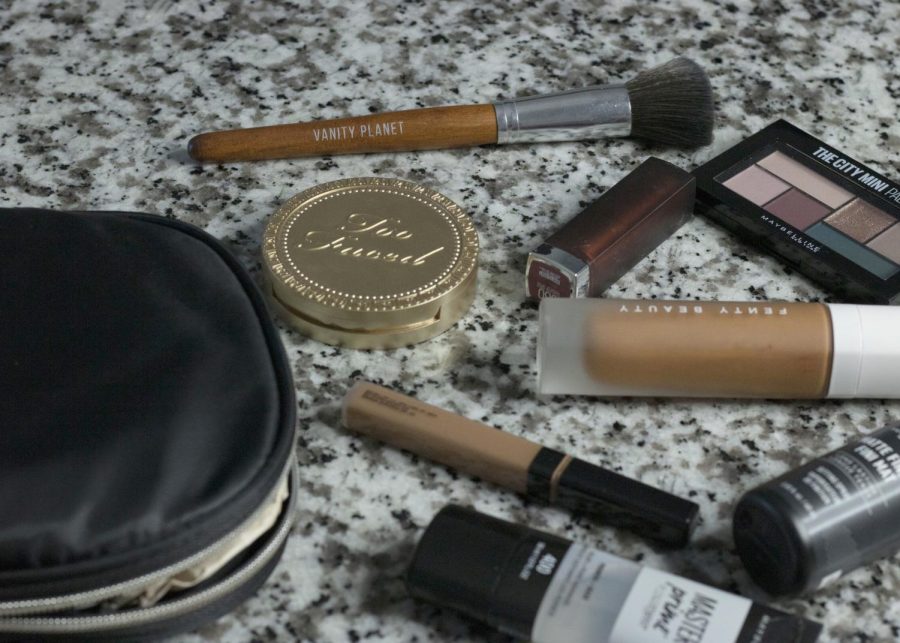What’s hiding in your makeup bag? (A MAG)
Makeup bags are essential for a girl on the go. Using a small bag to put all your daily cosmetic necessities in is a great way to prepare yourself in case you need to touch up your makeup away from home.
The thing about makeup bags is that they should really only have the necessities and nothing else. Sometimes cosmetics and makeup brushes can pile up inside those bags, resulting in some serious issues for your skin.
According to Refinery29, “It’s a well-known fact that makeup bags are a breeding ground for bacteria,” Dr. Anjali Mahto, a consultant dermatologist at the Cadogan Clinic, explains. “Many laboratory based tests where makeup items have been swabbed have shown the growth of all sorts of different microbes that can cause infection.”
According to an Instagram poll of 148 people, 52 percent of responders do not clean their makeup bags at all and 48 percent are only cleaning their makeup brushes once a year.
Using a dirty makeup bag or brushes can lead to irritated skin, pink eye and staph infections. When dirty makeup brushes sit inside a small makeup bag they are collecting and spreading any bacteria they come in contact with all the other items in your bag.
You don’t have to throw out any dirty makeup brushes, you just need to make sure you are taking care of them.
“As long as they’re in workable condition and the bristles aren’t falling out you can keep brushes for a lifetime if you invest in nice ones,” said freelance makeup artist Chrissy Hart. “You just have to properly clean them, which a lot of people don’t do.”
Hart shared helpful tips on how to apply your makeup as clean as possible.
“I struggle with breakouts so I use a clean makeup brush on myself every single time I apply my makeup,” Hart said. “I keep duplicates of all of my brushes. I probably have four or five of the same brush that I use all the time. I’ll use one then go through all of them and then deep clean all of them.”
According to Hello Rory, everyone has bacteria on their face but their skin is used to that specific bacteria. When your normal bacteria mixes with bacteria from a dirty makeup brush or a dirty eyeshadow palette it can cause an infection.
In a study done in outside labs by Nancy Crossley, founder of Beauty So Clean, she discovered that on average, “11 out of 25 products tested contained Staphylococcus aureus (a common cause of skin infections and food poisoning), Pseudomonas aeruginosa (which can trigger bloodstream infections and pneumonia) and E. coli.”
5 tips for fighting the beauty bacteria
Wash your makeup bag
“Wash it every couple of months,” Hart said. “Mine is black on the inside so I can see when it gets dirty.”
It is recommended that you use a clear plastic makeup bag. According to Sciencing, bacteria grows in dark, moist and warm places. Cleaning a plastic makeup bag is just as easy as a cloth makeup bag; either wipe it down with a disinfectant or just throw it in the washer and let it air dry.
Wash all makeup sponges and brushes at least once a week
Your makeup brushes encounter so many different products and surfaces it’s not surprising that they collect an impressive amount of bacteria. According to Bustle, dirty makeup brushes can clog your pores, cause viral infections, irritate the skin and cause breakouts.
Check expiration dates on all products every 3 months at least
According to Women’s Health magazine, “All of the molecules in these products can break down into something else, and you can have a reaction to it,” said Hadley King, M.D., a dermatologist at SKINNEY Medspa in New York City, who goes on to explain that if you experience irritation in response to the molecule breakdown, it could lead to inflammation.
“Be aware of using expired eye products because they can cause infections very easily,” Hart said. “People need to make sure they are throwing away their mascara after three months, even if you’ve only used it one or two times it does not matter.”
Make sure you are replacing your makeup once it expires.
According to skin care company Paula’s Choice, mascara and eyeliner last from three to six months. Cream, liquid or stick foundations and concealers and cream blushes last from six months to one year. Powder based products like blush, bronzer, highlighter and eyeshadow last for two to three years. Lipstick, lip gloss and lip pencils last from two to three years and lip balm typically lasts one year.
Properly store your makeup bag
Keep your makeup bag away from direct sunlight and heat; this relates back to the first tip. Bacteria thrives in warm, moist environments so you should never leave your makeup bag near a window or in your car.
According to BirchBox, “Sunlight will accelerate the aging of a product by heating it up, which can break down active ingredients.”
Wipe down your cosmetics
Wipe down any makeup products you are keeping inside your makeup bag. Hello Rory suggests spritzing makeup palettes and powders with rubbing alcohol.
Hart also suggests grabbing a tissue and wiping the top layer of all powder cosmetics.
“Powders don’t accumulate a ton of bacteria unless someone is really oily,” Hart said. “But if you take a tissue and wipe off the top layer it’s pretty much like you are starting brand new.”
This won’t damage your powder cosmetics, it will just kill the bacteria.



